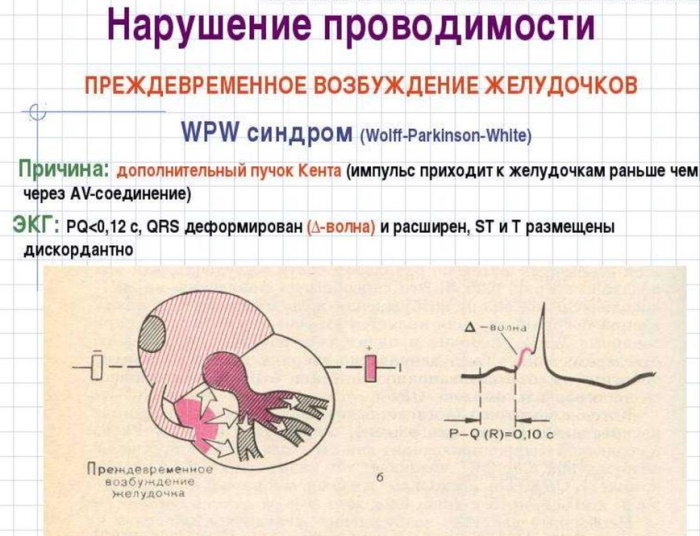Content
- Types of blood tests
- Clinical (general) analysis
- Blood chemistry
- Group affiliation of blood and determination of Rh factor
- Coagulogram (hemostasiogram) or blood test
- Blood sugar test
- Blood test for hormones
- Immunological blood test and allergological studies
- PCR blood test (polymerase chain reaction)
- HCG blood test
- Blood test for parasites
- Research for the presence of tumor markers
- Blood test for trace elements
- The cost of a blood test from a vein, finger
- Blood Test Videos
A blood test is one of the most common methods of clinical diagnostics of health due to the high information content. Before passing, you should familiarize yourself with what types of analyzes are and what is their feature.
Types of blood tests
The types of blood tests that exist today provide detailed information about the state of a person's health. They are among the most objective methods of diagnosing health, since any malfunction in the body is primarily reflected in the properties and composition of the blood. This is due to the fact that it passes through all organs and systems of the human body.
For the same reason, it is recommended to take a blood test every year, regardless of how you feel. This allows you to identify a specific disease or other disorders at an early stage. A properly selected scheme of prevention or treatment will help to avoid a number of complications.
Clinical (general) analysis
This analysis allows you to obtain information about the numerical parameters of blood cells and their types. Their list and brief description are presented in the table below.
| Red blood cell count | Responsible for the transfer of oxygen. |
| Hemoglobin | Contained in erythrocytes, it ensures the saturation of the body's cells with oxygen and the elimination of carbon dioxide. |
| Platelet count | Provide rapid control of bleeding. |
| Leukocytes | Helps fight infections and promote tissue healing. |
| ESR | Blood cell sedimentation rate. If it is increased, then we can assume the presence of an inflammatory process. |
| Hematocrit | The ratio of blood cell volume to total blood volume. A decrease may indicate the development of anemia, and an increase - about the development of various pathologies that require a more detailed study. |
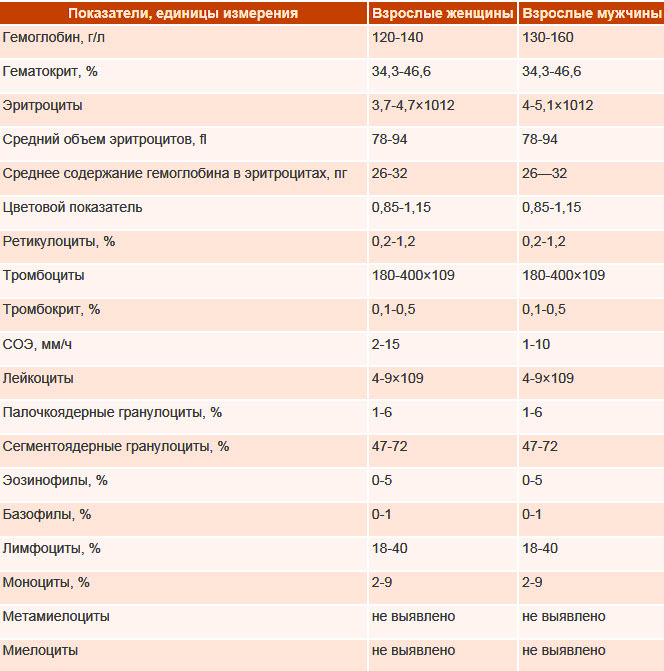 Indications for the appointment of a general blood test are:
Indications for the appointment of a general blood test are:
- Routine medical examinations.
- Before vaccination.
- Early symptoms of a certain disease or deterioration in well-being. This allows you to timely determine the origin of the disease, the presence of an inflammatory process or an allergic reaction.
- Evaluation of the effectiveness of the prescribed treatment. Usually, after passing the 1st analysis, treatment is prescribed and after a certain time, the analysis is repeated to track whether there are changes. If necessary, the treatment is adjusted.
Blood chemistry
The analysis refers to the universal diagnostic methods, which provides information about enzymes, organic and mineral substances. It helps to establish how correctly metabolic processes occur in the body and to assess the work of internal organs. Most often, the analysis is carried out when there is a suspicion of the presence of a latent course of the disease.
This makes it possible to identify certain pathologies at an early stage and stop its development with the help of correctly selected treatment. In some cases, biochemical analysis is the only option for an objective diagnosis.
During the analysis, such indicators are determined as:
- Urea and cholesterol.
- Glucose and Total Protein.
- Bilirubin (total).
- Residual nitrogen in the blood.
- Phospholipids and albumin.
- Data for iron, potassium, calcium and sodium.
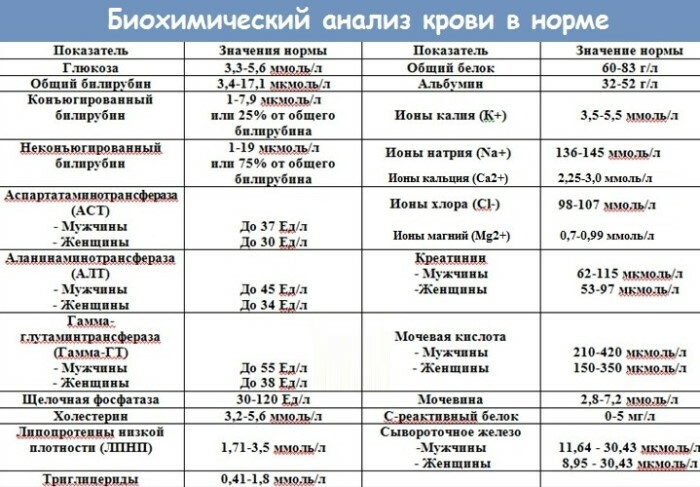
Most often, the analysis is prescribed for:
- Planned operations and preparation for hospitalization.
- Suspected diabetes mellitus.
- Pregnancy.
- Chronic diseases (cirrhosis, pancreatitis, diabetes mellitus, etc.).
- The appearance of specific symptoms of certain pathologies.
- The course of treatment (monitored).
Group affiliation of blood and determination of Rh factor
Blood type and Rh factor are indicators that do not change in a person throughout his life.
Their definition is carried out when:
- Need for blood transfusion.
- Chronic anemias of various origins.
- Preparing for surgery.
- Planning and managing pregnancy. During this period, it is important to know in advance what blood group a woman has in view of the possible need for emergency transfusion during childbirth. It is also important to know the Rh factor. If the expectant mother has it negative, and the future father is positive, then there is a high probability of developing a Rh conflict with the fetus. Then, during pregnancy, a woman needs to constantly undergo additional tests (for example, for the presence of antibodies) in order to avoid a pregnancy failure. And after the birth of a child, you should immediately determine his blood group and Rh factor. If the latter indicator does not coincide with the mother's, the woman is recommended to administer immunoglobulin.
- Suspicion of hemolytic disorders in a newborn (they can be caused by a difference in blood groups and Rh factor with the mother).
Coagulogram (hemostasiogram) or blood test
The coagulogram is aimed at assessing the blood clotting rate and the state of hemostasis (i.e. e. coagulation). This system includes platelets, coagulation factors that are dissolved in plasma and blood cells. The activation of the coagulation system begins in the event of a violation of the integrity of the vessel.
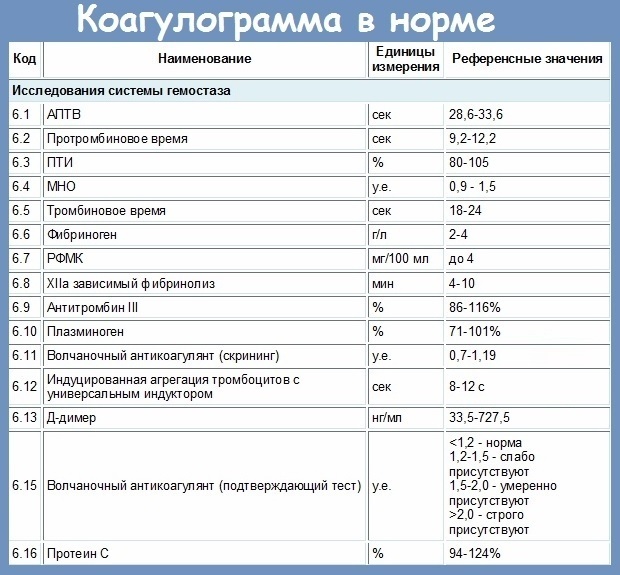
Then the following happens:
- A blood clot forms and prevents blood loss.
- After the bleeding stops, the formed thrombus dissolves.
- After the restoration of the damaged vascular wall, blood flow resumes.
With a violation of coagulation, this process does not occur and a large blood loss is observed. Therefore, a coagulogram is prescribed for increased bleeding (from bleeding gums to serious hemorrhages in the brain).
Also, an analysis is prescribed for a tendency to increased blood clots. This is the opposite situation - when a blood clot forms and normal blood flow and, accordingly, the blood supply to internal organs are disrupted.
In addition to 2 main cases, the analysis is prescribed for:
- Prescribing certain medications to patients that affect blood clotting.
- Planned surgical interventions to assess the possible risk in case of bleeding.
- Liver diseases (proteins responsible for blood clotting are synthesized in this organ).
Blood sugar test
Types of blood sugar tests provide information about the glucose level in the blood. This substance provides energy to all cells. A deviation from the norm indicates the presence of certain diseases. Thus, a low glucose level indicates problems with the functioning of the pancreas, adrenal glands, kidneys and liver.
And an elevated glucose level most often indicates the presence of diabetes mellitus. Other reasons include chronic inflammatory processes in the body, problems with the hypothalamus, liver, endocrine disorders. Also, an analysis is prescribed for diagnosed diabetes mellitus to control the disease.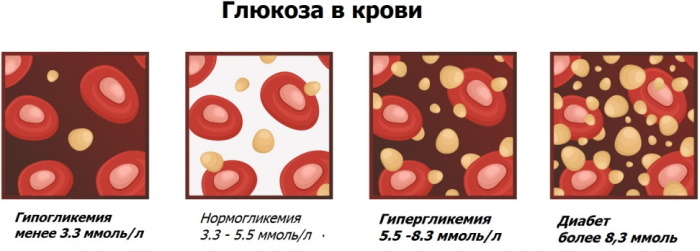
In addition to the analysis for sugar, a glucose tolerance test may be prescribed. It identifies the condition that precedes the onset of diabetes. Also, the analysis is taken during pregnancy in order to prevent a strong increase in the weight of the fetus due to an increase in the blood sugar level of a woman. Additionally, during pregnancy, the analysis reveals hidden pathologies, including diabetes.
Blood test for hormones
Hormones throughout life are involved in all processes in the body. When hormonal levels are disturbed, negative changes in health occur. Therefore, the delivery of the analysis determines whether a hormonal imbalance has occurred.
He is handed over to a medical referral if there is a suspicion of disturbances in the work of the endocrine system (it is she who produces hormones). Also, this analysis is mandatory for pregnant women - if there is a lack or excess of a certain hormone, pregnancy can fail.
Types of blood tests for hormones, allowing you to get a complete picture of the hormonal background, are:
- Sex hormones - estradiol (ensures the maturation of germ cells and the correct development of the fetus during pregnancy), progesterone, testosterone. In addition to pregnant women, the analysis is prescribed for women with menstrual irregularities, frequent miscarriages, infertility.
- Thyroid hormones. They are necessary for the normal functioning of all organs and cells of the body. The main hormones are T3 and T4.
- Pituitary hormones. 7 main hormones are produced, 4 of which contribute to the production of hormones by other glands. And 3 hormones have a direct effect. So, growth hormone provides bone growth in childhood and adolescence. Prolactin is responsible for puberty, and subsequently for ovulation and the production of breast milk after childbirth. MSH is a hormone that provides skin pigmentation.
- Adrenal hormones - they regulate all important processes in the body. These include adrenaline, aldosterone, cortisol.
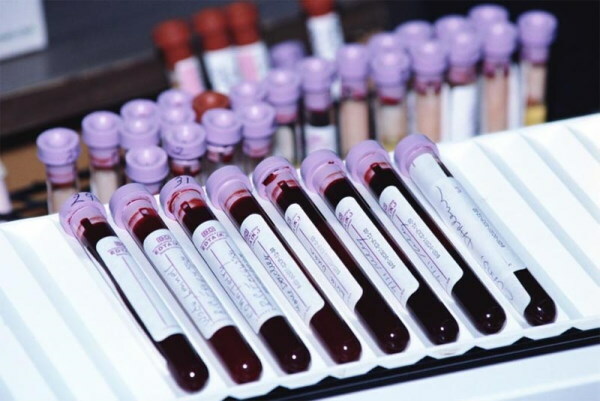 Women should be attentive to the delivery of tests - they are taken at a certain period of the menstrual cycle. This is indicated by the attending physician.
Women should be attentive to the delivery of tests - they are taken at a certain period of the menstrual cycle. This is indicated by the attending physician.
Immunological blood test and allergological studies
This analysis provides information about the state of immunity - how much the immune defense is involved, whether antibodies are present, how many immune blood cells are in the blood. Early diagnosis reveals the presence of immunodeficiencies, as well as a number of serious diseases (autoimmune, infectious, hematological and others).
One of the indications for an immunological analysis is the presence of allergic reactions of various origins. The presence of specific antibodies to a specific allergen is examined in the blood. Their production by the immune system occurs as a result of its malfunctioning - substances that are not dangerous, after entering the body, it regards as viruses or bacteria.
As a result, specific symptoms develop (runny nose, sneezing, headaches, cough, etc.), which are long lasting. In some situations, a study is carried out for a number of allergens, since if the immune system is disturbed, an allergic reaction can be provoked simultaneously by several factors.
PCR blood test (polymerase chain reaction)
This method detects in the blood the presence of pathogens of various infections, or rather their DNA. In the process of research, the DNA or RNA of the microorganism is artificially increased. Since they are unique for everyone, research error is excluded.
In addition to high accuracy, the advantages of the method are:
- Versatility - you can work with any biological material.
- Multitasking - in addition to the established pathogen, you can simultaneously determine others without distorting the results.
- An accurate diagnosis of the disease, which is still in the incubation period, and there are no signs of the disease.
- Efficiency - the whole process with material sampling and research takes only 1 day.
 Since this is one of the most demanded types of diagnostics in medicine, the analysis is prescribed in various fields - from the diagnosis of various infections to the establishment of paternity.
Since this is one of the most demanded types of diagnostics in medicine, the analysis is prescribed in various fields - from the diagnosis of various infections to the establishment of paternity.
HCG blood test
This analysis is one of the most important methods for diagnosing developing pregnancies. It is prescribed to confirm pregnancy along with the existing nonspecific signs. The advantage of the method lies in its accuracy - it shows the presence of pregnancy from 6 days after conception.
Often it is taken in a complex of screening with ultrasound diagnostics to control pregnancy throughout the entire period. Also, the level of hCG is monitored in various programs to support pregnancy (for example, with IVF), since it ensures the production and balance of progesterone and estrogen.
Other indications for taking tests in women are:
- oncology of trophoblast;
- violation of the menstrual cycle;
- suspicion of the development of an ectopic pregnancy or missed pregnancy;
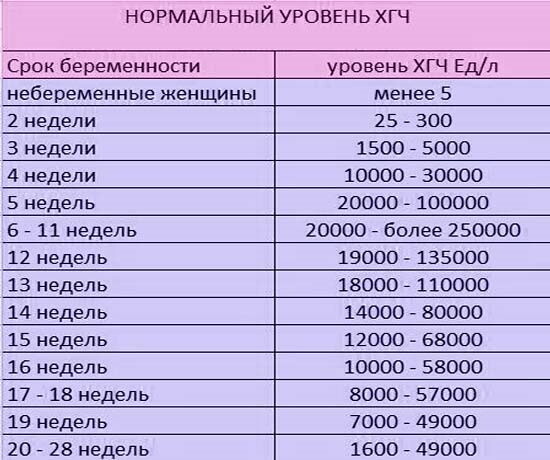
The analysis is also prescribed for men with malignant tumors of the testicles.
Blood test for parasites
A blood test is the most effective and informative method for detecting parasites of any kind - not only worms, but also the simplest microorganisms. The determination takes place by detecting antibodies in the blood (the immune system reacts to the antigen of any parasite by producing antibodies).
The indications for testing are:
- Admission of children to educational institutions.
- Admission of children to sports sections and various circles.
- When working in the field of catering and trade.
- Working with children (teachers, trainers, educators).
- Identification of specific symptoms as a result of a medical examination.
Even in the absence of signs of parasite infestation, the study is recommended to be carried out at least once a year. Children should be tested more often - once every 6 months. With the same frequency, examination is recommended for people in contact with pets or agricultural animals that cultivate the soil.
Research for the presence of tumor markers
Tumor markers are protein substances that are constantly present in the body. With the development of a malignant tumor, their number increases sharply. But sometimes this growth can be associated with other disorders in the body or with carrying out physiotherapy procedures. Therefore, the referral for the delivery of the analysis is provided by the doctor, and only he can interpret the results obtained and prescribe treatment.
The analysis is indicated for delivery to people with a hereditary predisposition to oncology, workers at hazardous work and those who are at high risk (alcohol dependence, long-term smoking).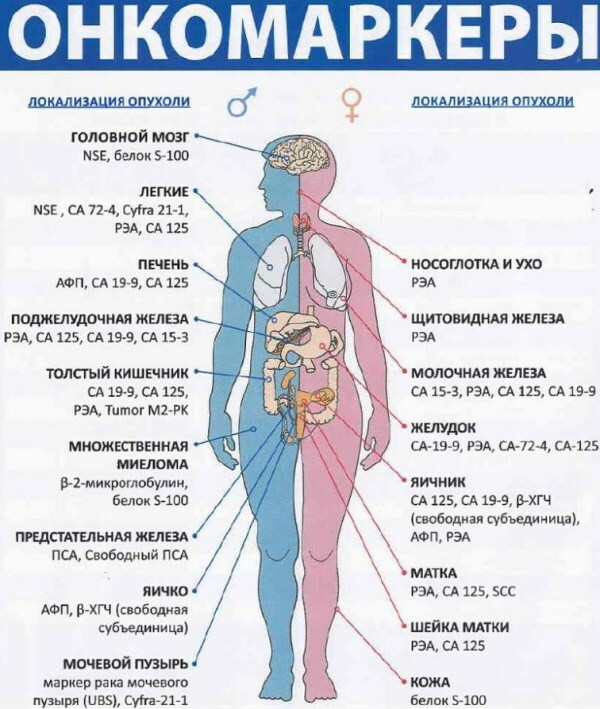
Also, the study is carried out with identified oncology to monitor the patient's condition and the effectiveness of the selected treatment. Assign the delivery of tests and after recovery, in order to timely determine the onset of relapse.
Blood test for trace elements
With the help of this analysis, it is possible to establish how well the organs and systems of the body function, whether there is a tendency to chronic and endocrine diseases. In the presence of a deficiency of a certain element in a person, a deterioration in well-being occurs, and the level of immune defense decreases.
Therefore, the analysis is regularly recommended for such groups of the population as:
- Children and adolescents.
- Aged people.
- People living in ecologically unfavorable regions.
- For women during pregnancy, lactation, as well as when planning pregnancy.
- Frequently ill people and those who have chronic diseases.
- Adhering to diet and other dietary restrictions (for example, vegetarians).
- People who work day and night.
The cost of a blood test from a vein, finger
The types of blood tests have different costs depending on the complexity of the study being conducted. Also, the price is influenced by the speed of obtaining results. Each laboratory sets its own cost, which may differ depending on the region. The table below shows the approximate price for the main types of analyzes.
| Analysis type | Finger fence, rub. | Fence from a vein, rub. |
| Clinical analysis. | 500 | 500 (is more accurate) |
| Biochemical analysis | From 2000 | |
| Blood type and Rh factor | RUB 350 Separately, each analysis costs about 200 rubles. | |
| Coagulogram | from 800 rubles | |
| For sugar | 250-270 | |
| Analysis for hormones | From 500 rubles. for determining the level of 1 hormone. An analysis is usually taken to determine the complex of hormones. | |
| Blood test for allergens | About 650 rubles. for sensitivity to 1 allergen | |
| PCR | From 300 rubles. for the determination of 1 pathogen | |
| HCG blood test | From 550 | |
| Blood test for parasites | From 500 rubles. (for the detection of antibodies to 1 type of parasite) | |
| Research for the presence of tumor markers | On average, the cost of determining 1 tumor marker is 900 rubles. | |
| Blood test for trace elements | The cost depends on the investigated trace element. The initial price for 1 substance is about 100 rubles. |
The types of blood tests available can help diagnose or prevent a number of health problems. To obtain reliable results, it is important to properly prepare for the tests, taking into account the recommendations of the doctors.
Blood Test Videos
Complete blood count is normal:


